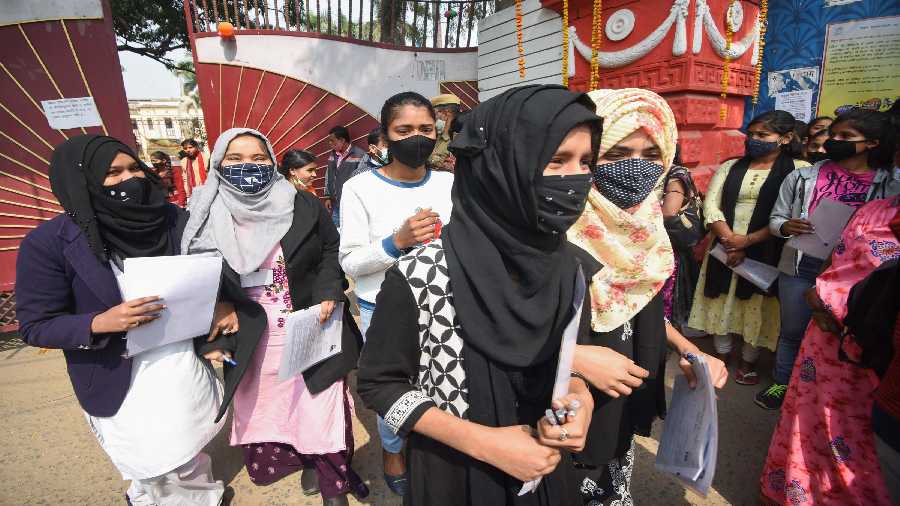The Karnataka government on Tuesday told the High Court that there is no restriction on wearing Hijab in India with reasonable restrictions subject to institutional discipline and dismissed the charge that denial to wear the headscarf was a violation of Article 15 of the Constitution, which prohibits discrimination of every sort.
Countering the petitioner Muslim girls from Udupi district, who challenged the restriction on Hijab inside the educational institutions, Karnataka Advocate General Prabhuling Navadgi said the right to wear the headscarf falls under the category of 19(1)(A) and not Article 25 as has been argued by the petitioners.
"The right to wear Hijab falls under Article 19(1)(A) and not Article 25. If one wishes to wear Hijab, then there is no restriction 'subject to the institutional discipline'. The rights claimed under Article 19(1)(A) is related to Article 19(2) where the government places a reasonable restriction subjected to institutional restriction," Navadgi told the full bench of the Karnataka High Court.
The full bench of Chief Justice Ritu Raj Awasthi, Justice J M Khazi and Justice Krishna M Dixit is hearing a batch of petitions seeking permission to wear Hijab inside the classroom.
Navadgi further said the institutional restriction in the present case is only inside the educational institutions and not anywhere else.
Arguing further, he said the independent claim of 19(1)(A) cannot go together with Article 25.
"The consequence of the demand to declare Hijab as an essential religious practice is huge because there is an element of compulsion or else you will be expelled from the community," Navadgi told the court.
Article 19(1)(A) is related to the freedom of expression of the Indian constitution.
Article 19(2) says that nothing in sub clause (a) of clause ( 1 ) shall affect the operation of any existing law, or prevent the State from making any law, in so far as such law imposes reasonable restrictions on the exercise of the right conferred by the said sub clause in the interests of the sovereignty and integrity of India, the security of the State, friendly relations with foreign States, public order, decency or morality or in relation to contempt of court, defamation or incitement to an offence.
Article 25 deals with freedom of conscience and free profession, practice and propagation of religion and says that subject to public order, morality and health and to the other provisions of this part, all persons are equally entitled to freedom of conscience and the right freely to profess, practise and propagate religion.
Further, the AG dismissed the charge that denial to wear Hijab was a violation of Article 15 of the Constitution, which prohibits discrimination of every sort.
"There is no discrimination whatsoever, as has been claimed invoking under Article 15. These are bland allegations," Navadgi argued.
Article 15 prohibits discrimination on grounds of religion, race, caste, sex or place of birth.
Stating that dignity of women is paramount, Navadgi winded up his argument quoting the famous number from 1967 Hindi movie Hamraaz -- Na Munh Chhupa Ke Jiyo, Na Sar Jhuka Ke Jiyo. Ghamo Ka Daur Bhi Aye To Muskara Ke jiyo. (Neither live hiding your face, nor bow down. Even in trying times, live with a smile.)
The song was penned by Sahir Ludhianvi and sung by Mahendra Kapoor.
Meanwhile, the bench said it wishes to dispose of the case this week itself and sought the cooperation of all the parties involved.
As soon as the court proceedings began, a lawyer appearing for the petitioner girls requested the bench for some relaxation to the Muslim girls who wish to appear in the schools and colleges with Hijab.
The Chief Justice said, "We want to finish this case this week itself. Make all endeavours to finish this case by the end of this week."
On January one, six girl students of a college in Udupi attended a press conference held by the Campus Front of India (CFI) in the coastal town protesting against the college authorities denying them entry into classrooms wearing hijab.
This was four days after they requested the principal permission to wear hijab in classes which was not allowed. Till then, students used to wear the headscarf to the campus, but entered the classroom after removing it, college principal Rudre Gowda had said.
"The institution did not have any rule on hijab-wearing as such and since no one used to wear it to the classroom in the last 35 years. The students who came with the demand had the backing of outside forces," Gowda had said.











